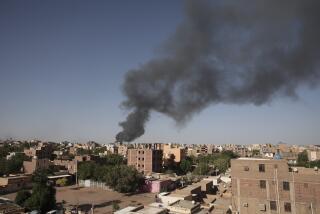Doing the Right Thing Can Be Very Risky : Relief effort is essential--but is U.S. thinking it through?
- Share via
Brian Urquhart, the former undersecretary general of the United Nations and a diplomat known for his measured language, describes the American-led move to set up protected camps for Kurdish refugees in Iraq as unprecedented. Mark that word. There is no political model for what the United States, with help from Britain and France, has set out to do. There is no experience to draw on that could provide a road map for how this particular humanitarian mission, however worthy, can be neatly ended. This isn’t to say that the move to help the Kurds isn’t warranted; it is, and the urgency of their plight demands that no efforts to deliver help be spared.
But there appears to be little enthusiasm in the United Nations for officially blessing this involvement. Custom--and the U.N. Charter--have heretofore regarded such internal conflicts as matters strictly within the domestic jurisdiction of sovereign states. Facts have to be faced. In going into northern Iraq, the United States could be entering an arena from which no quick exit is visible.
An American official admits that the Bush Administration is winging it right now on the Kurdish issue. What it hopes to do is get the relief effort launched, using up to 10,000 American troops, and then turn the matter over to appropriate international agencies, ending U.S. involvement. The organizational problems of the task are staggering. An estimated 800,000 Kurds have so far fled their homes and trekked into the cold and arid mountains near the Turkish border; more are likely to follow. To provide for their needs will require creating from scratch five or six vast tent cities, each accommodating and providing for well over 100,000 people. It’s the kind of engineering and logistics challenge that the armed forces tend to respond to superbly. But what happens after that challenge is met?
The Kurds fled their cities and villages because they were terrified of the vengeance they faced at Saddam Hussein’s hands after their failed revolt. That terror abides. It’s why, as part of the inducement to get them to leave the mountains and move into tent cities on the flatlands, they have been assured of Western military protection. This too is necessary. But unless the regime in Baghdad changes, and unless Saddam’s successors can be counted on to treat the Kurds with untraditional decency, the need for armed protection will remain, perhaps for years to come. Who will provide that protection?
Don’t count on the United Nations. Its refugee relief agreement with Iraq limits foreign participation under its auspices to unarmed civilians. Meanwhile, any U.S. effort to get the Security Council to approve an armed force stationed on Iraqi territory seems certain to run into China’s adamant resistance; Beijing, sensitive over Tibet, can be expected to veto any plan that might seem to set a precedent for foreign interference.
Who, then, in the absence of a forgiving new regime in Baghdad that would allow the Kurds to return to their homes unmolested, will protect them from violent repression, even from the possibility of genocide? Who, indeed, except for the United States, Britain and France. Having accepted the noble humanitarian responsibility of providing succor to the Kurds, the three Western powers have also assumed the implicit moral commitment of protecting them from a vicious persecutor. Under the circumstances, there was no choice, nor is this life-saving intervention anything that has to be apologized for.
But it is also true that the commitment of the United States and its allies to the Iraqi Kurds is probably not something that can be handed over to someone else soon--because there is no one else ready or equipped to take on the job. How long will that commitment run? For now, this necessary humanitarian effort had best be seen as open-ended.
More to Read
Sign up for Essential California
The most important California stories and recommendations in your inbox every morning.
You may occasionally receive promotional content from the Los Angeles Times.













